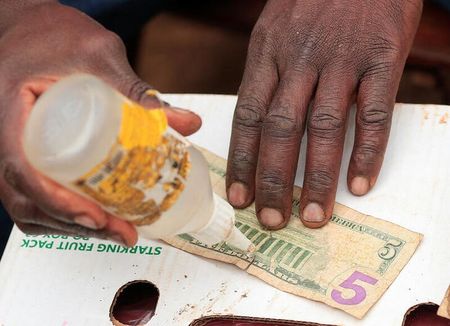By Nyasha Chingono
HARARE (Reuters) – Zimbabwean black market currency trader Cuthbert Gudza holds up a $2 dollar note to assess a tear in it, and delicately applies glue to make it whole again. He then leaves it in the sun to dry out, declaring it’s “as good as new”.
Well-worn U.S. dollar notes are finding a new home on the streets of Harare, where they are bought at nearly half their value for resale at a profit after mending, as Zimbabweans find creative ways to survive an unrelenting financial onslaught.
Following the collapse of the Zimbabwe dollar in 2009 amid record-breaking inflation, locals have relied on the greenback for daily transactions. But with limited access to the U.S. currency, some grimy notes are making a fresh comeback.
Rejected by supermarkets and other formal traders, the torn notes have found takers like Gudza at a bustling Kuwadzana township shopping centre, about 15 km west of central Harare.
Even though Zimbabwean banks are mandated to accept soiled money in exchange for crispy notes, general mistrust in the financial system after people lost their savings due to hyperinflation has seen black market traders preferred over banks.
At the shopping centre, a booming voice from a portable speaker shouts: “We buy torn dollars at a good price, rush here.”
“If the serial number from both sides is visible, it qualifies for sale,” said Gudza, a 33-year-old father of three.
“I am a potato seller, but I saw buying torn U.S. dollar notes as another business opportunity. These notes are rejected in supermarkets, but I take them for resale,” he said.
“We pay 600 Zimbabwe dollars per every U.S. dollar. Those who do not want money, we sell them our produce, including potatoes, oranges or apples,” added Gudza. “If I cannot patch up the notes, I take them to the bank.”
Aware of the trend, the central bank has asked citizens to make use of official channels to exchange old notes.
“The Reserve Bank is very clear about the soiled notes and if you have a problem, the central bank is ready to take them in exchange for better notes,” said Reserve Bank of Zimbabwe Monetary Policy Committee member, Persistence Gwanyanya.
“Banks should be in a position to accept them,” Gwanyanya told Reuters.
(Reporting by Nyasha Chingono; Editing by Olivia Kumwenda-Mtambo and Bernadette Baum)








